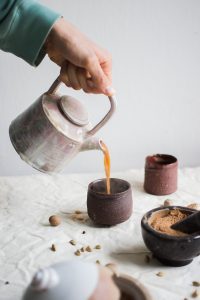In this article, we are going to uncover the amazing benefits of ginger tea and what it does to our bodies when consumed in good amounts. Let’s get started…
Ginger tea is a popular spice that can be used to offer a somewhat sweet, slightly spicy flavor to flavored tea mixes. Ginger is a Southeast Asian herb that has been used in herbal therapy for millennia to cure nausea, indigestion, common cold, and other diseases.
Table of Contents
To make ginger tea, steep dried or fresh ginger in hot water for a few minutes to allow the oils of the ginger to permeate into the water before consuming.
The flavor of this tea is warming and slightly spicy. You can create your own by grating or slicing fresh ginger into a mug, or you can buy it dried, loose, or in teabags.
Herbal tea is a drink that may be enjoyed at any time of day. It’s a great pick-me-up in the morning, but you could also find it useful after a meal to aid digestion.
Nutritional Value of Ginger Tea
Ginger tea is not only a flavorful and refreshing beverage but also offers several potential health benefits. While the exact nutritional value can vary depending on the preparation and concentration of ginger in the tea, here are some of the key components and potential health benefits associated with ginger tea:
- Calories: Ginger tea is generally low in calories. A cup of ginger tea prepared with 1 teaspoon of ginger root typically contains less than 5 calories.
- Gingerols: Gingerols are bioactive compounds found in ginger. They possess anti-inflammatory and antioxidant properties, which may help reduce oxidative stress and inflammation in the body.
- Antioxidants: Ginger contains various antioxidants, such as gingerol, paradol, and shogaol. These antioxidants help combat free radicals, which are unstable molecules that can cause damage to cells and contribute to chronic diseases.
- Anti-nausea properties: Ginger has long been used as a natural remedy for nausea, including morning sickness, motion sickness, and chemotherapy-induced nausea. Drinking ginger tea may help alleviate these symptoms.
- Digestive health: Ginger tea is often consumed to aid digestion. It can stimulate the production of digestive enzymes, promote bile flow, and soothe the gastrointestinal tract, potentially relieving symptoms such as bloating, gas, and indigestion.
- Anti-inflammatory effects: The gingerols in ginger have shown potential anti-inflammatory effects, which may be beneficial for reducing inflammation in conditions like osteoarthritis, rheumatoid arthritis, and general muscle soreness.
- Immune support: Ginger contains immune-boosting properties that may help strengthen the immune system and fight off common infections, thanks to its antimicrobial and anti-inflammatory properties.
- Blood sugar regulation: Some studies suggest that ginger may help regulate blood sugar levels by improving insulin sensitivity. However, more research is needed to establish a definitive link.
It’s important to note that the nutritional value and specific health benefits of ginger tea can vary based on the concentration and quality of ginger used, as well as the brewing method.
While ginger tea can be a beneficial addition to a healthy lifestyle, it’s always advisable to consult with a healthcare professional for personalized advice, particularly if you have any underlying medical conditions or take medications that may interact with ginger.
Health Benefits of Ginger Tea
 1. Help to boost the immune system
1. Help to boost the immune system
Ginger tea can help you stay healthy and safe by boosting your immune system, especially in time of pandemics. Ginger has antibacterial characteristics by warding off hazardous infections. Ginger tea’s anti-inflammatory properties might also assist to keep your immune system in good shape.
“To stay healthy, drink ginger tea”
2. Relieve stomach pains.
Ginger tea is probably most known for its ability to relieve digestive problems or stomach pains, particularly nausea. Ginger may be useful to the digestive tract as well, it can lower esophageal sphincter’s tension, bloating and cramps are reduced and avoid indigestion and flatulence.
3. Alleviate arthritis symptoms.
The anti-inflammatory effects of ginger could help those with osteoarthritis and rheumatoid arthritis. A cup of ginger tea can be a terrific approach to relieve muscle discomfort, adding ginger tea after your meal my soothing aches and pains.
4. Reduce inflammation
Ginger tea has also been demonstrated to aid in the reduction of inflammation, and it has been used in herbal therapy for millennia for its potent anti-inflammatory properties. Recent research supports suggestions that ginger has anti-inflammatory qualities. These have been demonstrated to have antibacterial and anti-inflammatory properties, which may help sustain a healthy microbiome when consumed as tea.
5. Ease pain when dysmenorrhea attacks
A cup of ginger tea might assist alleviate symptoms and relieving cramps if you’re having menstruation pain or dysmenorrhea. According to one study, ginger is as effective as pain relievers like mefenamic and buscopan. Ginger was found to be effective in reducing the duration and intensity of period discomfort in another investigation.
 6. Relieve headaches and migraine
6. Relieve headaches and migraine
There has been a lot of research done on ginger and its pain-relieving effects, including its potential value for people who suffer from migraines and headaches. As a result, ginger tea may be useful for both preventing and treating headaches.
7. Prevent colds and fight sore throat
A cup of ginger tea can aid in the prevention of cold symptoms and uncomfortable sore throats. Ginger, in particular, has antibacterial qualities that can aid in the treatment of infections such as strep throat. Ginger can also aid in the treatment of respiratory ailments.
Final Thoughts
Ginger has a distinct flavor that may not be to everyone’s liking. Ginger tea may produce bloating or heartburn in some people, and because of its potential blood-pressure-lowering effects, it should be drunk in moderation by those with low blood pressure or who are using blood pressure drugs.
Ginger tea can be brewed with fresh root, powder, or tea bags. Before consuming ginger, anyone on blood-thinning medication or going to undergo surgery should consult a doctor.
Did we miss anything? Comment below to add to our list of benefits of ginger tea.











5 thoughts on “7 Powerful Benefits of Ginger Tea”